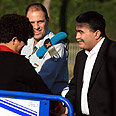
Peretz told war commission he thought army was prepared for war
According to transcripts released Thursday morning, defense minister told commission that probed Lebanon war, ‘I was not presented with a situation that the army had not trained enough’
"On July 12 (the first day of the war), I was not presented with a situation that the army had not trained enough or that there was any problem with the army's preparedness," Peretz said.
According to the commission’s transcripts, which were released Thursday morning, the defense minister said he had estimated that the whole campaign would last 10-14 days.
"I assumed that the international community would not give us any longer than that, although I thought that the longer we give our forces to operate, the more we will weaken Hizbullah," Peretz said.
Peretz told the commission he was “at peace” with his conduct during the war.
“I think I acted as an involved defense minister day in and day out,” he said.
According to the transcripts, the defense minister denied having ever said that Hizbullah leader Hassan Nasrallah would “never forget his name,” and pointed to the cut in the defense ministry’s budget as one of the reasons for the army’s poor performance.
As to his relations with former chief of staff Dan Halutz during the war, Peretz told the war commission “we had good working relations”, adding that “I felt Halutz gave me all the necessary tools and information so I could do my job well.”
The partial Winograd report, which was published last Monday, slammed Peretz’s conduct prior to and during the war.
"He has no knowledge or experience on diplomatic, military, government affairs,” the report said.
“He has no knowledge on the use of the military as tool to achieve goals. Nevertheless, he took decisions without consultation, and didn't give enough weight to contrary views. He failed to fulfill his role, and he didn't act out on the basis of a strategic plan."










